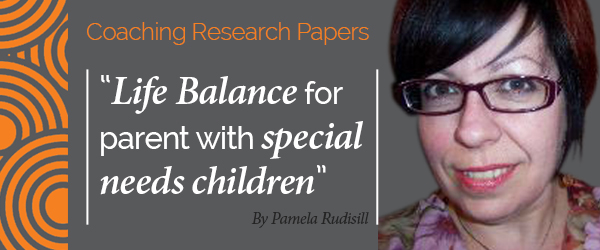
(Women’s Transformational Coach, UNITED STATES)
Introduction
Difficulties in coping with the strain on a family’s physical, emotional, and economic resources when caring for a special needs child make it difficult to maintain a functional and well-balanced family.
Between the years of 2006 and 2008, approximately 10 million U.S. children between the ages of 3 and 17 were reported by their parents to have a developmental disability, which is 1 in 6 children. This figure rose from about 12.8% of children in 1997 – 1999 to 15% in 2006 – 2008, an addition of $1.8 million children in the U.S.[i] These development disabilities include ADHD, intellectual disability, cerebral palsy, autism, seizures, stuttering or stammering, moderate to profound hearing loss, blindness, learning disorders and/or other developmental delays. Much of the increase in numbers is driven by ADHD and Autism diagnoses.[ii] Currently, approximately 10% of the world’s population, around 650 million people, live with a disability.[iii] The magnitude of the need for parental support is evident in the statistics.
Objective
Parents confront enormous challenges in raising a child with special needs. I intend to show how coaching can facilitate a more well-balanced life for the parents and families of special needs children and young adults.
Defined Terms
- Caregiver Stress Syndrome (CSS). Caregiver Stress Syndrome is the physical and psychological impact of chronic stress and the demands associated with caregiving.[iv]
- Developmental Disability. Developmental disabilities are birth defects related to a problem with how a body part or body system works. They may also be known as functional birth defects. Many of these conditions affect multiple body parts or systems.[v]
- Individualized Education Programs (IEPs). An IEP is a program designed to meet the unique education needs of one child, who may have a disability, as defined by federal regulations. It is intended to help them reach their educational goals, and help teachers and related service providers understand the student's disability and how it affects the learning process.
- Special Needs. The individual requirements (as for education) of a person with a disadvantaged background or a mental, emotional, or physical disability or a high risk of developing one.
Internal & External Challenges
Health
Initially, one or both parents may be shocked, confused, angry, and/or depressed at the time of their child’s diagnosis. They will experience a loss of the dreams they had for their child and can become hopeless about their child’s future, and the future of their family. Parents often blame themselves for their child’s disability. They can also become anxious if they lack the parenting skills necessary for raising a child with special needs.
Caring for a special needs child exacts a physical, emotional and psychological toll. Caregiver Stress Syndrome can result from this challenge. The signs and symptoms of Caregiver Stress Syndrome include constant fatigue, irritability, sleep problems, anxiety and depression, problems with memory, hypertension, headaches, and a decreased immune system, leaving the caregiver more susceptible to infections, like the common cold, or flu. Symptoms range from mild to severe, where burnout or more serious health issues could occur.ii
Coaching can support the parents by actively listening and helping them gain a more positive perspective as they work through the grief process after receiving their child’s diagnosis. They can provide success stories, resources, and create a safe space for the parents to express themselves honestly. A coach can help also help the parents identify their strengths and abilities and apply them to parenting and learning different ways of handling stressful times.
Acceptance & Trust
Parents can develop a lack of trust in the professionals they look to for guidance due to misdiagnosis, mistrust in a doctor’s prescription of medicine and not listening to the parent’s concerns, etc. They may also question the professional’s recommended treatment if the parent does not have a good understanding of their child’s disability.
The coach can provide resources to help educate the parents on their child’s disability. This education, along with the use of coaching tools, such as THE WORK of Byron Katie®[vi], and acting as a sounding board during coaching sessions, can help them discern the truth about what is appropriate treatment for their child.
Resources
Parents may not have enough information to locate resources available to them, such as waivers that provide funds for respite care, therapies, and transition services for young adults. Without these resources, parents can feel isolated and despair of a better life for their children and themselves. When they do get access to these resources, they must navigate through multiple complex service systems and process often conflicting information about their child’s disability and available treatment.
Coaching can support the parents by providing resources and helping them to develop practices for relieving stress as they go through the process of setting up services for their child.
Relationships
The relationship the parents have with their other children, friends, and relatives can become strained as they shift more of their focus to their child with special needs. They often commit so much of their lives to their child with special needs that they can lose themselves in the process.
The divorce rate is higher for parents of children with disabilities partially due to the financial strain from medical and treatment costs, lack of time for each other and for themselves, different parenting styles, and one parent having difficulty accepting the validity of their child’s diagnosis. If this should happen, a burden is often placed on the other parent to take on the majority of their child’s additional care.
Coaching can support the parents by engaging in role-play with them to create an environment of self and other awareness. Creative time management and self-care may also be explored to reduce stress and better resolve conflicts.